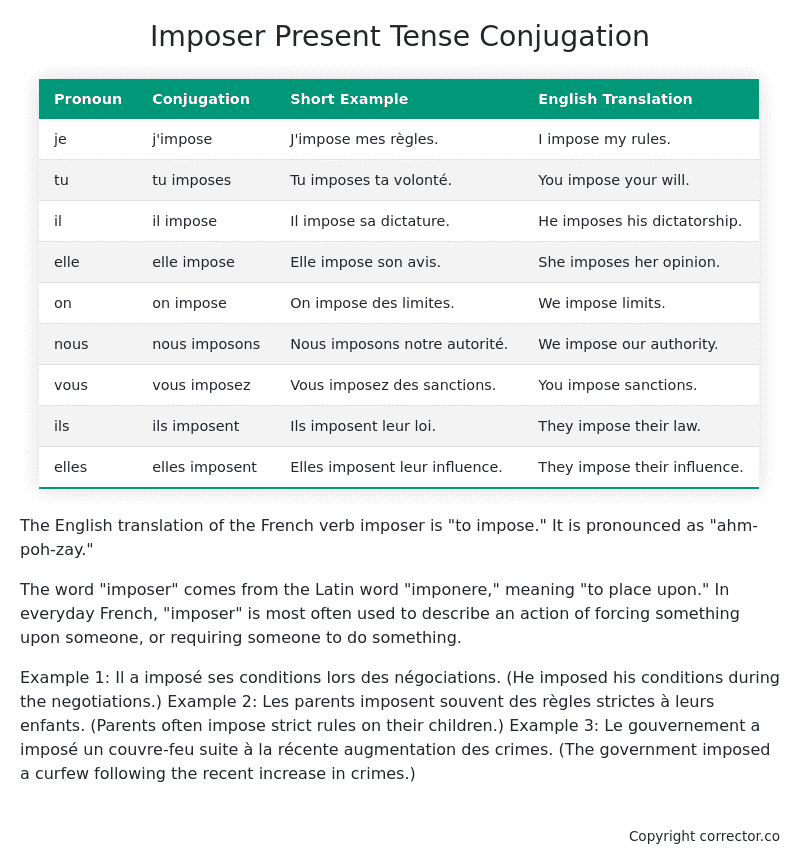Le Present (Present Tense) Conjugation of the French Verb imposer
Introduction to the verb imposer
The English translation of the French verb imposer is “to impose.” It is pronounced as “ahm-poh-zay.”
The word “imposer” comes from the Latin word “imponere,” meaning “to place upon.” In everyday French, “imposer” is most often used to describe an action of forcing something upon someone, or requiring someone to do something.
Example 1: Il a imposé ses conditions lors des négociations. (He imposed his conditions during the negotiations.)
Example 2: Les parents imposent souvent des règles strictes à leurs enfants. (Parents often impose strict rules on their children.)
Example 3: Le gouvernement a imposé un couvre-feu suite à la récente augmentation des crimes. (The government imposed a curfew following the recent increase in crimes.)
Imposer – About the French Present Tense
To take a deep dive into all the French tenses then see our article on Mastering French Tense Conjugation.
Common Everyday Usage Patterns For Le Present
Interactions with Other Tenses
Table of the Present Tense Conjugation of imposer
| Pronoun | Conjugation | Short Example | English Translation |
|---|---|---|---|
| je | j’impose | J’impose mes règles. | I impose my rules. |
| tu | tu imposes | Tu imposes ta volonté. | You impose your will. |
| il | il impose | Il impose sa dictature. | He imposes his dictatorship. |
| elle | elle impose | Elle impose son avis. | She imposes her opinion. |
| on | on impose | On impose des limites. | We impose limits. |
| nous | nous imposons | Nous imposons notre autorité. | We impose our authority. |
| vous | vous imposez | Vous imposez des sanctions. | You impose sanctions. |
| ils | ils imposent | Ils imposent leur loi. | They impose their law. |
| elles | elles imposent | Elles imposent leur influence. | They impose their influence. |
Other Conjugations for Imposer.
Le Present (Present Tense) Conjugation of the French Verb imposer (this article)
Imparfait (Imperfect) Tense Conjugation of the French Verb imposer
Passé Simple (Simple Past) Tense Conjugation of the French Verb imposer
Passé Composé (Present Perfect) Tense Conjugation of the French Verb imposer
Futur Simple (Simple Future) Tense Conjugation of the French Verb imposer
Futur Proche (Near Future) Tense Conjugation of the French Verb imposer
Plus-que-parfait (Pluperfect) Tense Conjugation of the French Verb imposer
Passé Antérieur (Past Anterior) Tense Conjugation of the French Verb imposer
Futur Antérieur (Future Anterior) Tense Conjugation of the French Verb imposer
Subjonctif Présent (Subjunctive Present) Tense Conjugation of the French Verb imposer
Subjonctif Passé (Subjunctive Past) Tense Conjugation of the French Verb imposer
Subjonctif Imparfait (Subjunctive Imperfect) Tense Conjugation of the French Verb imposer
Subjonctif Plus-que-parfait (Subjunctive Pluperfect) Tense Conjugation of the French Verb imposer
Conditionnel Présent (Conditional Present) Tense Conjugation of the French Verb imposer
Conditionnel Passé (Conditional Past) Tense Conjugation of the French Verb imposer
L’impératif Présent (Imperative Present) Tense Conjugation of the French Verb imposer
L’infinitif Présent (Infinitive Present) Tense Conjugation of the French Verb imposer
Struggling with French verbs or the language in general? Why not use our free French Grammar Checker – no registration required!
Get a FREE Download Study Sheet of this Conjugation 🔥
Simply right click the image below, click “save image” and get your free reference for the imposer Present Tense tense conjugation!

I hope you enjoyed this article on the verb imposer. Still in a learning mood? Check out another TOTALLY random French verb present conjugation!


